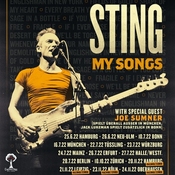
Be yourself, no matter what they say...
That's what his songs are like. And that's what he is, the star who looks back on a 45-year career: Sting finds the right word for every problem, even if he's taciturn on stage at Mainz's Volkspark.
The urban green space fully lives up to its name – Mainz's Volkspark is in a state of emergency. Thousands of people are milling around in tropical temperatures in the spacious complex on the site of the former Fort Weisenau. They are using the area, which was fenced off a few weeks ago for the "Summer in the City" event series, and the extensive grounds surrounding it, in this case as cost-conscious onlookers. Due to the heat of the past few weeks, the green idyll has taken on a steppe-like appearance in sandy earth tones, and the police are ensuring law and order among the considerable crowd.
An artist has been announced for the evening who has been a voice for a better future for decades: Sting. To date, Gordon Matthew Thomas Sumner, his real name, has always found the right words for every situation, whether it concerns the threatened state of the planet in general or that of the South American rainforest in particular, the current political situation, the well-being of the individual within the social collective, or the spiritual state of the sensitive artist himself. Expertise paired with shrewd rhetoric makes up a significant part of the multifaceted image of the British multi-talent. Together with his rich talent as a singer, bassist, composer, and lyricist, they helped Sting achieve decades of global stardom.
It has been 45 years since he founded the trio The Police in London with drummer Stewart Copeland and guitarist Henri Padovani, who was soon replaced by Andy Summers. In the retrospective "My Songs," which has been on tour for months, Sting explores his artistic history. When he performed at Mannheim's SAP Arena in March 2022, he addressed his audience with weighty words between songs. In the Volkspark, however, the still wiry, slim seventy-year-old prefers the Anglo-American artist credo "Let the music do the talking," his vocabulary containing only succinct phrases like "Thank you, Mainz."
"Message In A Bottle," the first of a total of seven songs from the Police era, symbolically kicks things off. A first highlight, which engages the audience for minutes, follows immediately. "Englishman In New York," Sting's homage to the British gay activist, bon vivant, and author Quentin Crisp, includes the slogan-like refrain "Be yourself – no matter what they say." Pragmatic life advice can also be found in the classics "Rushing Water," "If It's Love," "Fields Of Gold," "Heavy Cloud No Rain," and "If I Ever Lose My Faith In You."
Especially since the acoustics are perfectly balanced, and the band behind Sting, consisting of new drummer Josh Freese, Kevon Webster (keyboards), Shane Sager (harmonica), Dominic Miller and his son Rufus (both on electric guitar), as well as harmony vocalists Melissa Musique and Gene Noble, proves to be excellent. The very young Sager plays the harmonica well, not only on the song "Brand New Day," which he once wrote with Stevie Wonder. Harmony vocalist Noble assists on the R&B duet "Shape of My Heart."
"Walking On The Moon," originally recorded in a Munich hotel room under a full moon, has lost none of its magic, just like the rest of the Police classics, "So Lonely," "King Of Pain," "Every Breath You Take," and "Every Little Thing She Does Is Magic."
Dominic and Rufus Miller deliver two-part guitar masterpieces on the Arabian-inspired "Desert Rose." On the penultimate song, "King Of Pain," Sting invites his son Joe Sumner into the spotlight for another duet. The son also performed as support act, but lacks his father's class. Nevertheless, he is allowed to raise his voice on the popular hit "Every Breath You Take." After just over 70 minutes, the official part ends. The team returns to rapturous applause for a powerful "Roxanne," a longer reggae jam, and the quietly impressive ballad "Fragile," featuring Sting on acoustic guitar.
(c) Frankfurter Allgemeine by Michael Köhler


